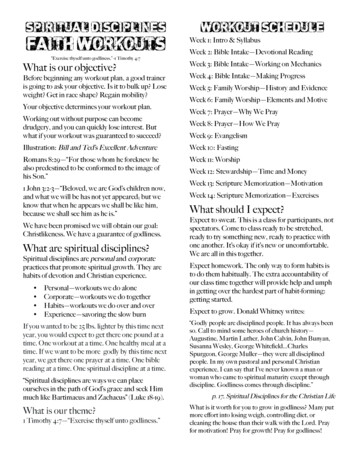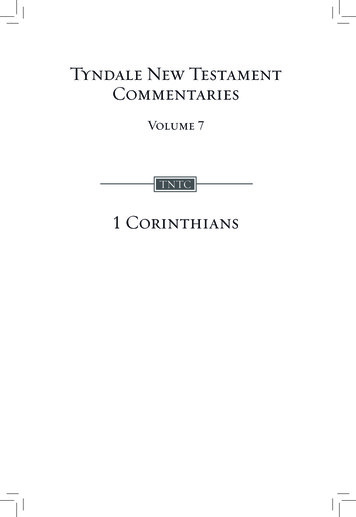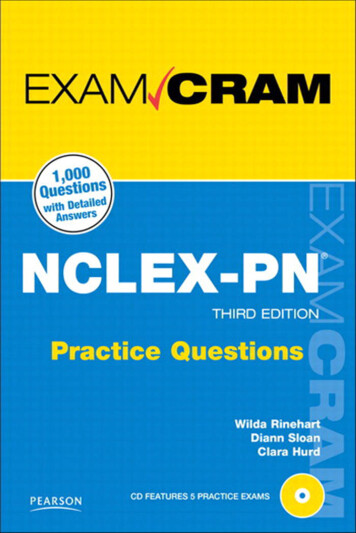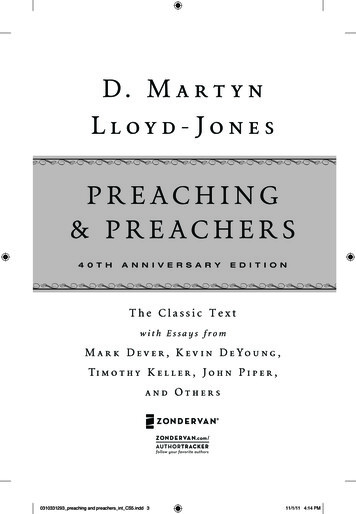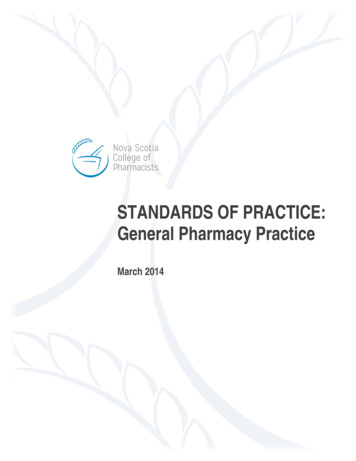
Transcription
The PRACTICE of GODLINESS
The Practice of GodlinessthePRACTICEof“Godliness has value for all things” 1 Timothy 4:8GODLINESSJERRY BRIDGESJerry BridgesA NavPress resource published in alliancewith Tyndale House Publishers, Inc.
NavPress is the publishing ministry of The Navigators, an internationalChristian organization and leader in personal spiritual development.NavPress is committed to helping people grow spiritually and enjoy livesof meaning and hope through personal and group resources that arebiblically rooted, culturally relevant, and highly practical.For more information, visit www.NavPress.com.The Practice of GodlinessCopyright 1983, 1996, 2008 by Jerry Bridges. All rights reserved.A NavPress resource published in alliance with Tyndale House Publishers, Inc.NAVPRESS and the NAVPRESS logo are registered trademarks of NavPress, The Navigators, Colorado Springs, CO. TYNDALE is a registered trademark of Tyndale House Publishers, Inc.Absence of in connection with marks of NavPress or other parties does not indicate an absenceof registration of those marks. Designed by Julie ChenAuthor photograph by Steve LearnedAll Scripture quotations, unless otherwise indicated, are taken from the Holy Bible, New Inter national Version, NIV. Copyright 1973, 1978, 1984 by Biblica, Inc. Used by permission.All rights reserved worldwide. Scripture quotations marked ASV are taken from The Holy Bible, American Standard Version. Scripture quotations marked NASB are taken from the New American Standard Bible, copyright 1960, 1962, 1963, 1968, 1971, 1972, 1973, 1975, 1977, 1995 by The Lockman Foundation.Used by permission.Scripture quotations marked GNT are taken from the Good News Translation in Today’s EnglishVersion, Second Edition, copyright 1992 by American Bible Society. Used by permission. Scripture quotations marked AMP are taken from the Amplified Bible, copyright 1954, 1958,1962, 1964, 1965, 1987 by The Lockman Foundation. Used by permission.Scripture quotations marked KJV are taken from the Holy Bible, King James Version.Some of the anecdotal illustrations in this book are true to life and are included with the per mission of the persons involved. All other illustrations are composites of real situations, and anyresemblance to people living or dead is coincidental.Library of Congress Cataloging-in-Publication DataNames: Bridges, Jerry, author.Title: The practice of godliness / Jerry Bridges.Description: Colorado Springs : NavPress, 2016. Originally published: references.Identifiers: LCCN 2016003098 ISBN 9781631465949 ISBN 9781631465956 (e-pub) ISBN 9781631465963 (kindle)Subjects: LCSH: Christian life. Virtues.Classification: LCC BV4501.3 .B75225 2016 DDC 248.4—dc23 LC record available athttp://lccn.loc.gov/2016003098Printed in the United States of America227216205194183172161
CONTENTSPrefaceChapter 1:Chapter 2:Chapter 3:Chapter 4:Chapter 5:Chapter 6:Chapter 7:Chapter 8:Chapter 9:Chapter 10:Chapter 11:Chapter 12:Chapter 13:Chapter 14:Chapter 15:Chapter 16:Chapter 17:Chapter 18:ixValue for All Things 1Devotion to God 7Train Yourself to Be Godly 23Seeking a Deeper Devotion 37Taking On God’s Character 49Humility 67Contentment 81Thankfulness 97Joy 105Holiness 119Self-Control 131Faithfulness 147Peace 157Patience 169Gentleness 183Kindness and Goodness 193Love 205Reaching the Goal 219DISCUSSION GUIDEHow to Use This Discussion Guide 231Lesson 1: The Foundation for Godliness 233Lesson 2: Growing in Godliness 239vii
Lesson 3:Lesson 4:Lesson 5:Lesson 6:Lesson 7:Lesson 8:Lesson 9:Lesson 10:Lesson 11:Lesson 12:Developing a Godly Character 245Humility 251Contentment and Thankfulness 257Joy 263Holiness 269Self-Control and Faithfulness 275Peace 279Patience and Gentleness 285Kindness and Goodness 291Love 295Notes 301Author 305viii
PREFACEThis book is a sequel to an earlier book, The Pursuit of Holiness.In Ephesians 4:20‑24, Paul urges us to put off our old selfand put on the new self. The Pursuit of Holiness dealt largelywith putting off the old self—dealing with sin in our lives. ThePractice of Godliness focuses on putting on the new self—grow ing in Christian character.The most well-known list of Christian character traits is thenine-fold list in Galatians 5:22‑23, which Paul calls the fruit ofthe Spirit. But there are other lists in passages such as Colossians3:12‑16, Ephesians 4:2‑3 and 32, James 3:17, and 2 Peter 1:5‑7that are just as important to our understanding of what con stitutes Christian character. I’ve incorporated most of these inthis series of studies.While in the process of doing a series of Bible studies onChristian character traits, I became interested in the subjectof godliness. As my knowledge of that topic grew, I becameconvinced that any treatment of Christian character would beincomplete without the inclusion of a study on godliness.Godliness is more than Christian character. It covers theix
T H E P R AC T I C E O F G O D L I N E S Stotality of the Christian life and provides the foundation uponwhich Christian character is built. Thus the first four chaptersdeal with the general theme of godliness, and the remainingchapters consider important character traits of the godly person.The order in which the studies of the various charactertraits appear is deliberate. The first four—humility, content ment, thankfulness, and joy—deal largely with our relationshipto God. The next group of three—holiness, self-control, andfaithfulness—are qualities that require us to deal sternly withourselves. The final six—peace, patience, gentleness, kindness,goodness, and love—are qualities that enable us to deal gra ciously and tenderly with others. These last two divisions reflectthe seeming dichotomy of Christian character: sternness withourselves and tenderness toward others. Only the Holy Spiritcan create such a beautiful diversity of sternness and tendernesswithin a single human personality.The variety of topics covered in a book of this nature requiresthat each subject be treated only briefly. My objective is to cre ate an awareness of the importance of each of the aspects ofgodliness and provide some practical suggestions for growingin them. Hopefully, many readers will be stimulated to do fur ther study on some of the topics of particular interest to them.As I studied the subjects of both godliness and Christiancharacter, I was somewhat amazed that I could find so little thathas been previously written on these subjects. Consequently, Ihave had to plow new ground in some areas. This has forced meback to the Scriptures more than if I had had the advantage ofthe writings of previous generations. My one qualification forpresenting these studies, then, lies in thirty years of personalBible study using methods and tools available to any layman.x
P r e faceThere is a certain sense of anxiety in committing thesestudies to print that comes from the warning of James that“not many of you should presume to be teachers, my broth ers, because you know that we who teach will be judged morestrictly” (James 3:1). I am keenly aware of the need for moregrowth in my own life in many of the areas covered in this book.It is my prayer, however, that both author and readers will growtogether as we practice godliness.This book should be studied more than read. To facilitatethat study, I have prepared a companion discussion guide to beused in conjunction with it. Though the book text is completein itself, the use of the companion Bible study will enable thereader and student to gain a better grasp of the scriptural truthstaught.I am deeply indebted to the staff of NavPress for theirencouragement to write this book and for their help in prepar ing the manuscript for final production.xi
Chapter OneVALUE FOR ALL THINGSFor physical training is of some value,but godliness has value for all things,holding promise for both the present lifeand the life to come.1 Timothy 4:8There is no higher compliment that can be paid to a Christianthan to call him a godly person. He might be a conscientiousparent, a zealous church worker, a dynamic spokesman forChrist, or a talented Christian leader, but none of these thingsmatters if, at the same time, he is not a godly person.The words godly and godliness actually appear only a fewtimes in the New Testament, yet the entire Bible is a book ongodliness. And when those words do appear they are pregnantwith meaning and instruction for us.When Paul wants to distill the essence of the Christianlife into one brief paragraph, he focuses on godliness. He tellsus that God’s grace “teaches us to say ‘No’ to ungodliness andworldly passions, and to live self-controlled, upright and godlylives” as we await the coming of our Lord Jesus Christ (Titus2:11‑13, emphasis added). When Paul thinks of his own job1
T H E P R AC T I C E O F G O D L I N E S Sdescription as an apostle of Jesus Christ, he describes it as beingcalled to further the faith of God’s elect and their knowledge ofthe truth that leads to godliness (see Titus 1:1).In his first letter to Timothy, Paul emphasizes godliness. Weare to pray for those in authority, that we may live peaceful andquiet lives in all godliness and holiness. We are to train ourselvesto be godly. We are to pursue godliness—the word pursue indi cating unrelenting, persevering effort. Godliness with content ment is held forth as great gain; and finally, godliness has valuefor all things, holding promise for both the present life and thelife to come.When Peter, in looking forward to the day of the Lord whenthe earth and everything in it will be destroyed, asks what kindof people we ought to be, he answers that we are to live holyand godly lives (see 2 Peter 3:10‑12). Here Peter uses the mostmomentous event of all history to stir us up to our Christianduty—to live holy and godly lives.Surely, then, godliness is no optional spiritual luxury fora few quaint Christians of a bygone era or for some group ofsuper-saints of today. It is both the privilege and duty of everyChristian to pursue godliness, to train himself to be godly, tostudy diligently the practice of godliness. We don’t need anyspecial talent or equipment. God has given to each one of us“everything we need for life and godliness” (2 Peter 1:3). Themost ordinary Christian has all that he needs, and the mosttalented Christian must use those same means in the practiceof godliness.What then is godliness? What are the marks of a godly per son? How does a person become godly? I have asked a num ber of people the question, “What do you think of when you2
Va lue f o r A l l T h ingsthink of godliness?” The answers, though varied, always end upexpressing some idea of Christian character, using such expres sions as “Godlike,” “Christlike,” or “the fruit of the Spirit.”Godliness certainly includes Christian character, but it is morethan that. There is another, even more fundamental aspect ofgodliness than godly character. It is the foundation, in fact, onwhich godly character is built.DEVOTION IN ACTIONThe Bible begins to give us some clues about godliness in itsearliest pages. Genesis 5:21‑24 tells us about Enoch, the fatherof Methuselah. In a very short three-verse summary of Enoch’slife, Moses twice describes him as one who “walked with God.”The author of Hebrews gives Enoch a place in his great “FaithHall of Fame” in chapter 11, but he sees Enoch from a slightlydifferent perspective. He describes him as “one who pleasedGod.” Here, then, are two important clues: Enoch walked withGod, and Enoch pleased God. It is evident from these two state ments that Enoch’s life was centered in God; God was the focalpoint, the polestar of his very existence.Enoch walked with God, he enjoyed a relationship withGod, and he pleased God. We could accurately say he wasdevoted to God. This is the meaning of godliness. The NewTestament word for godliness, in its original meaning, conveysthe idea of a personal attitude toward God that results in actionsthat are pleasing to God.1 This personal attitude toward God iswhat we call devotion to God. But it is always devotion in action.It is not just a warm, emotional feeling about God, the kind offeeling we may get while singing some grand old hymn of praiseor some modern-day chorus of worship. Neither is devotion to3
T H E P R AC T I C E O F G O D L I N E S SGod merely a time of private Bible reading and prayer, a prac tice we sometimes call “devotions.” Although this practice isvitally important to a godly person, we must not think of it asdefining devotion for us.FOCUSED ON GODDevotion is not an activity; it is an attitude toward God. Thisattitude is composed of three essential elements: The fear of GodThe love of GodThe desire for GodWe will look at these elements in detail in chapter 2, but fornow, note that all three elements focus upon God. The prac tice of godliness is an exercise or discipline that focuses upon God.From this Godward attitude arises the character and conductthat we usually think of as godliness. So often we try to developChristian character and conduct without taking the time todevelop God-centered devotion. We try to please God withouttaking the time to walk with Him and develop a relationshipwith Him. This is impossible to do.Consider the exacting requirements of a godly lifestyle asexpounded by the saintly William Law. Law uses the word devo tion in a broader sense to mean all that is involved in godli ness—actions as well as attitude:Devotion signifies a life given, or devoted to God.He therefore is the devout [godly] man, who lives nolonger to his own will, or the way and spirit of theworld, but to the sole will of God, who considers God4
Va lue f o r A l l T h ingsin everything, who serves God in everything, whomakes all the parts of his common life, parts of piety[godliness], by doing everything in the name of God,and under such rules as are conformable to his Glory.2Note the totality of godliness over one’s entire life in Law’sdescription of the godly person. Nothing is excluded. God is atthe center of his thoughts. His most ordinary duties are donewith an eye to God’s glory. In Paul’s words to the Corinthians,whether he eats or drinks or whatever he does, he does it all forthe glory of God (1 Corinthians 10:31).Now, it is obvious that such a God-centered lifestyle cannotbe developed and maintained apart from a solid foundationof devotion to God. Only a strong personal relationship withthe living God can keep such a commitment from becomingoppressive and legalistic. John writes that God’s commands arenot burdensome; a godly life is not wearisome, but this is trueonly because a godly person is first of all devoted to God.Devotion to God, then, is the mainspring of godly character.And this devotion is the only motivation for Christian behaviorthat is pleasing to God.This motivation is what separates the godly person from themoral person, or the benevolent person, or the zealous person.The godly person is moral, benevolent, and zealous because ofhis devotion to God. And his life takes on a dimension thatreflects the very stamp of God.It is sad that many Christians do not have this aura of godli ness about them. They may be very talented and personable, orvery busy in the Lord’s work, or even apparently successful insome avenues of Christian service, and still not be godly. Why?5
T H E P R AC T I C E O F G O D L I N E S SBecause they are not devoted to God. They may be devoted to avision or to a ministry or to their own reputation as a Christian,but not to God.Godliness is more than Christian character; it is Christiancharacter that springs from a devotion to God. But it is also truethat devotion to God always results in godly character. As westudy the three essential elements of devotion in the next chap ter, we will see that all of them, individually and collectively,must express themselves in a life that is pleasing to God. So thedefinition of godliness we will use in this book is devotion to Godthat results in a life that is pleasing to Him.In the first few chapters of this book we will concentrateon this devotion, seeking to understand what it is and whyit results in Christian character. In the later chapters we willlook at individual traits of godly character. But we must neverlose sight of the fact that devotion to God is the mainspring ofChristian character and the only foundation upon which it canbe successfully built.6
DISCUSSIONGUIDE2 29
HOW TO USE THISDISCUSSION GUIDEThis Bible study is designed to be used in conjunction with thebook The Practice of Godliness. It may be used for personal Biblestudy, Sunday school classes, or Bible study discussion groups.Please notice that the lessons in this study guide don’t cor respond directly to the chapters in the book. Some of the bookchapters are combined in the study lessons. We created the studyguide this way to compress the lessons into a shorter amountof time (twelve weeks, if you do one per week) than the bookwould allow (eighteen chapters).Although intended as a companion to The Practice ofGodliness, this study is designed to direct you first into theScriptures and then into the author’s text. Seeing and under standing what the Scriptures say on a subject is much moreimportant than demonstrating that you know what the booksays. For this reason, please complete the study questions based2 31
T H E P R AC T I C E O F G O D L I N E S Son Scriptures pertaining to each chapter before reading the cor responding chapters in the book. Ideally, the author’s text willsimply reinforce what you have already learned directly fromthe Bible. If, after reading the author’s text, you wish to reviseany of your answers, do so in the margin of this study.The goal of any Bible study should be the application ofpractical, biblical truths to your daily life. As James says, “Donot merely listen to the word, and so deceive yourselves. Dowhat it says” (1:22). For this reason, the last question of eachlesson is an opportunity for you to write down a personal appli cation from the study. To be of value, this application should bespecific and practical, with some personal checkup built into it.Only in this manner will we avoid the danger that James warnsus about.2 32
Lesson OneTHE FOUNDATIONFOR GODLINESS(Chapters One and Two)1. Godliness is more than a character trait. It is a founda tional spiritual quality that makes the entire Christian lifedynamic, effective, and pleasing to God. To gain a clearerpicture of this vital quality, look up the following verses ofScripture and write down the key thought about godlinessfound in each passage.1 Timothy 4:71 Timothy 4:81 Timothy 6:62 33
T H E P R AC T I C E O F G O D L I N E S S1 Timothy 6:11Titus 2:11‑122 Peter 1:32 Peter 3:10‑122. Thinking about the information you compiled in question 1, how would you summarize the value of godliness in two or three sentences?3. What two important facts do Genesis 5:21‑24 andHebrews 11:5 tell us about Enoch?How do these two passages describe a godly person?234
D iscussion G uide4. Read chapter 1 of The Practice of Godliness. How is godliness defined on page 3?Does this definition differ in any way from what you haveunderstood godliness to be in the past? What is new toyou about the book’s definition?What are the three essential elements of devotion to God?(See pages 4–6.)What other elements do you feel are important in devotion to God?Write down any other truths from chapter 1 of ThePractice of Godliness that are especially meaningful to you.5. Some people consider the “fear of God” to be basically anOld Testament concept. How do the following passagesdemonstrate that the fear of God is still important for ustoday?2 35
T H E P R AC T I C E O F G O D L I N E S SIsaiah 11:1‑3Acts 9:311 Peter 1:176. The Bible describes two apparently contradictory attitudes the Christian ought to hold toward God: fearand confidence. What insights do the following passages suggest to you about how you can hold both these attitudes in your heart at the same time?Romans 8:15; 1 Timothy 6:15‑16; Hebrews 10:19;12:28‑297. What does 1 John 4:8‑10 teach us about the extentof God’s love?236
D iscussion G uideCan you think of other passages of Scripture that teachthe same idea?8. How personal did Paul believe God’s love was, andwhat effect did this personalized love have on him?(See 2 Corinthians 5:14‑15; 1 Timothy 1:14‑16.)9. How do the following verses describe the desire the writers of Scripture had for God?Psalm 27:4Psalm 42:1‑2Psalm 63:1Philippians 3:102 37
T H E P R AC T I C E O F G O D L I N E S S10. Read chapter 2 of The Practice of Godliness. What additional important truths do you see there concerningdevotion to God?11. A good way to make your study of godliness practical isto plan specific applications you can make in your dailyspeech, attitudes, and behavior. Take a moment to thinkout and write down some applications of godliness thatcould challenge you this coming week. As you do this,consider which Scripture passages used in this study orin chapters 1 and 2 of The Practice of Godliness would behelpful to keep in mind for these applications.238
presenting these studies, then, lies in thirty years of personal Bible study using methods and tools available to any layman. THE PRACTICE OF GODLINESS x. There is a certain sense of anxiety in committing these s

